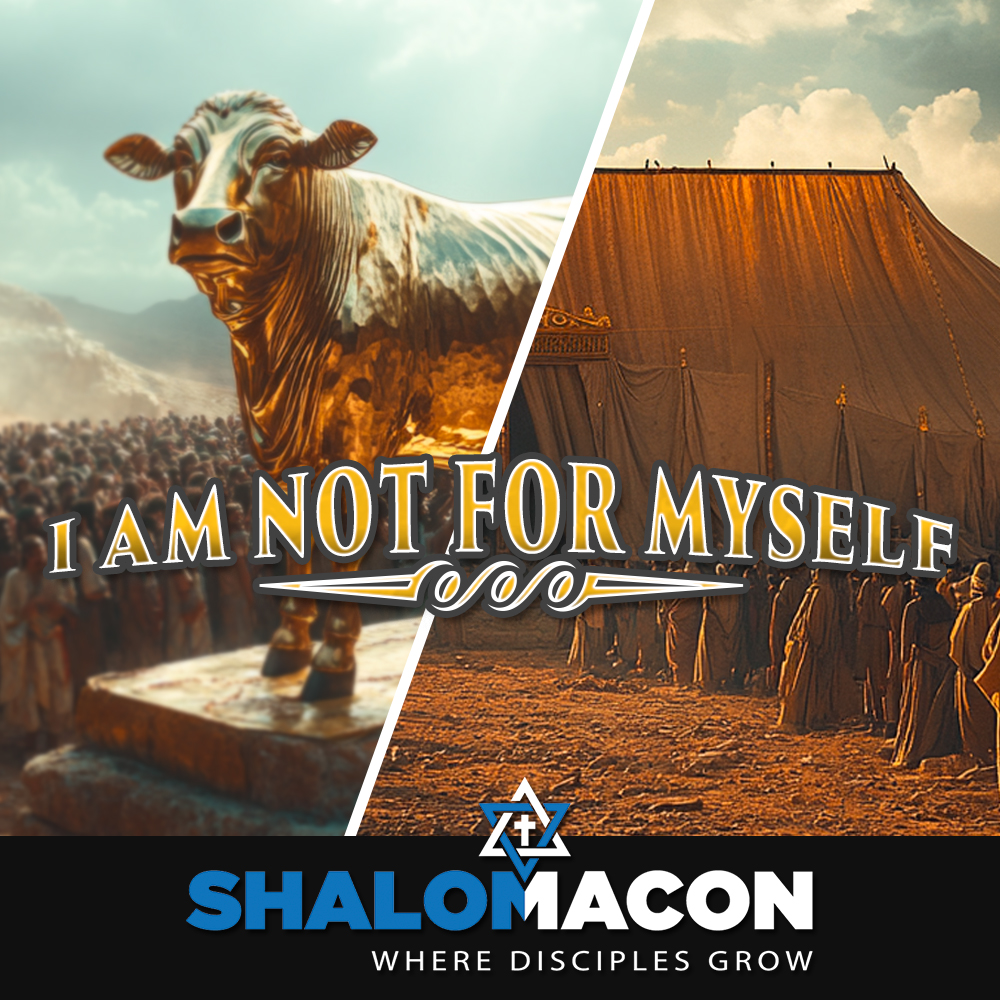[00:00:00] Speaker A: What is the sharpest weapon in the world? A spear? A knife? A sword? A razor? Actually, there's something each one of us have that's much sharper and far more deadly than any of these. This tiny little thing has caused the most bloodshed of any weapon known to man, and we tend to use it far too frequently, especially against the people we love the most. What am I talking about? Let's take a look in this week's five minute Torah.
Welcome back, Shalomis. Welcome to another episode of the five minute Torah. Before we get into the actual five minutes or so of the five minute Torah, here's a brief overview of this week's Torah reading. This week we're studying the Torah portion of Keddoshim, Leviticus 19 one through 2027, and here are the three things that you need to know about it. Number one, holiness more than a badge the theme of holiness permeates this week's tour portion, setting the stage for how God's people are to conduct themselves in all context. This commandment to be holy, as expressed in the opening verse, you shall be holy, for I, the Lord your God, am holy, serves as the foundational call that influences all subsequent laws and ethical instructions. Detailed in this Torah portion, holiness is depicted not only through adherence to specific religious rituals and observances, but also through everyday actions and interactions with others. The laws laid out for us in Ketoshim span various acts of life, including ethical behavior, justice, respect for family and elders, and laws of sexual morality. In addition to those that we learned last week. Each of these reflect the sanctity God expects in both communal and personal life. By intertwining daily conduct with high moral and spiritual standards, Ketoshim challenges Israel to reflect God's holiness in every aspect of life. Number two priority of love who is my neighbor? In our current tour portion, the commandment to love your neighbor as yourself is a pivotal commandment that supports the entire framework of social and religious laws. This instruction, found in Leviticus 1918, is central to jewish ethical teachings and serves as a cornerstone for how any commandment of Torah is observed. It calls for empathy, respect, and a commitment to treat others with the same care and consideration one would desire for oneself. We see this principle echoed in the teachings of Yeshua, who emphasized it as the very essence of everything the Torah and the prophets teach us in the apostolic scriptures, Yeshua cites this commandment to love your neighbor as yourself and esteems it as one of the two greatest commandments. It is second only to loving God with all one's being and number three, serious the dangers of leftovers. When most people think of leftovers, they typically don't associate it with the wrath of God. Well, unless you're a friend of mine named Tara, but generally that's not the case. However, in this weeks Torah portion, we learn that there are serious consequences for anyone who saves the meat of his peace offering too long. When you offer a sacrifice of peace offerings to the Lord, you shall offer it so that you may be accepted. It shall be eaten the same day you offer it or on the day after, and anything left over until the third day shall be burned up with fire. If it is eaten at all on the third day, it is tainted. It will not be accepted, and everyone who eats it shall bear its iniquity because he has profane what is holy to the Lord, and that person shall be cut off from his people. Leviticus 16 five eight. According to this, if a peace offering is eaten on the third day, not only does the person who offered it incur guilt, but the merit he would have received from his gift is actually retroactively nullified. That's some serious eating right there. If you're looking for a place to learn, connect, and grow, then Shalom Macon is the place. It doesn't matter where you are in the world. You can find a connection with Shalom Macon through our live services every Saturday and through our private social network we call Shalom at home. Check us out on YouTube and on our
[email protected], for more information. We look forward to connecting with you and seeing you this Shabbat. This week's tour commentary is called Blood on our tongues and comes from my book five minute Torah, volume two. Parasite Kettleshim is only two chapters long, but this small Torah portion mentions an impressive total of 51 mitzvot, or commandments. Many are what might be considered ethical or moral laws which seem to stand out as natural and self evident, laws that are present within any society, laws prohibiting stealing, oppressing ones neighbor, or showing favoritism in court, for instance. There are also laws regarding honest business dealings, laws against adultery and honoring the elderly. However, one commandment is particularly interesting. You shall not go around as a slanderer among your people, and you shall not stand up against the life of your neighbor. I am the Lord. This is Leviticus 1916. In the second half of the verse, the English Standard version reads, you shall not stand up against the life of your neighbor. However, the original Hebrew says, lo ta'amod al dham reicha, or do not stand against the blood of your neighborhood the king James reads more like the literal Hebrew saying, neither shalt thou stand against the blood of thy neighbor. How are we supposed to understand this passage? What does it mean to stand against the blood of our neighbor when understood in isolation? The simple meaning of this passage is to not remain idle when someone is in trouble. If we know the life of another is in danger, we are responsible to take action to ensure that they are free from harm. This understanding can be applied in a number of ways, but it is particularly applicable when another individual threatens the safety of others. We must work to defend those whose lives are in harms way. Another interpretation of this passage is taken from the context and the language of the passage. Ur hachaim or chaim bin Moshe ibn Attar, a popular moroccan jewish commenter of the 18th century, understood this passage in connection to the first part of the verse, which prohibits slander. The plain meaning of the Torah is a warning to each individual not to become a vehicle for potential defamatory information about a second party. How does one prevent this? By not revealing any information, even innocent information, in the hearing of anyone who might use this information or part of it, and turn it into something defamatory. If that were to happen, then the person who merely related the original harmless sounding story shares part of the guilt. This is from or Hachaim on Leviticus 1916 there's a saying, loose lips sink ships or commentary is congruent with this saying. Sometimes we innocently relay information to another person that we have no business discussing, and it turns into a big mess and damages relationships. We must keep Yeshua's stern warning in mind to prevent this from happening. He said, I tell you, on the day of judgment, people will give account for every careless word they speak.
We must take him seriously. Other rabbis take this a step further and say that the blood in this passage is the blood that surfaces in the face of someone who has been publicly humiliated. Someone once told Nachman bar Yitzchak, anyone who humiliates another in public, it is as though he were spilling blood. Ravnachman bar Yitzhak said to him, you have spoken well, as we see that after the humiliated person blushes, the red leaves his face and pallor comes in its place, which is tantamount to spilling his blood. This is from Bhavamatsia 58 B. In other words, slandering someone is on par with shedding the blood of ones neighbor. How can we make this comparison? Isnt murder a much more heinous crime than gossip and slander? How can this be one of the reasons this association is made is when a person is murdered, his suffering ceases. However, when one is slandered, his suffering continues on. It's as if he were a walking dead man. It is a serious matter that Hashem despises. For instance, the psalmist proclaims, whoever slanders his neighbor secretly, I will destroy. This is psalm 101, verse five. Ezekiel also connects slander with bloodshed, saying, there are men in you who slander to shed blood. Ezekiel 22 nine on whatever level we understand this passage, we must realize that speaking badly against our brothers and sisters, particularly those who call themselves by the name of our master Yeshua, is a serious, serious offense, and those who commit such acts will not be acquitted easily. Do not speak evil against one another, brothers. The one who speaks against a brother or who judges his brother, speaks evil against the Torah and judges the Torah. But if you judge the Torah, you are not a doer of the Torah but a judge. This is James 411 may we be heedful of our words and speak only those things that are edifying to our brothers and sisters, so that we will not inflict injury to anyone and that the world may recognize us as true disciples of our master Yeshua. Weve all used words to hurt others, and weve had words used against us. If you could give someone one word of advice when it comes to loose lips, what would it be? Id love to hear your thoughts in the comments below. Please drop me a note and if you havent started studying Perke of oat with us, you need to start now. Its a seven part series that I did last year called Perkevot and the teachings of Yeshua. It will not only give you an introduction to Perkeveot, but give you a full, fresh perspective on Yeshua's teachings. You can check it out using the link above or at the end of this video. I'll see you next week for another messianic insight into the eternal Torah of God. Blessings from Shalom Macon, the place where disciples of Yeshua learn, connect, and grow.
[00:10:41] Speaker B: Please visit our website, shalommakin.org, to learn more about us. Join our live services, access other teachings sign up for our newsletter, join our private network that will connect you with our greater community from around the world, or contribute to the work of Shalom Macon. Thank you for watching and we look forward to connecting with.



